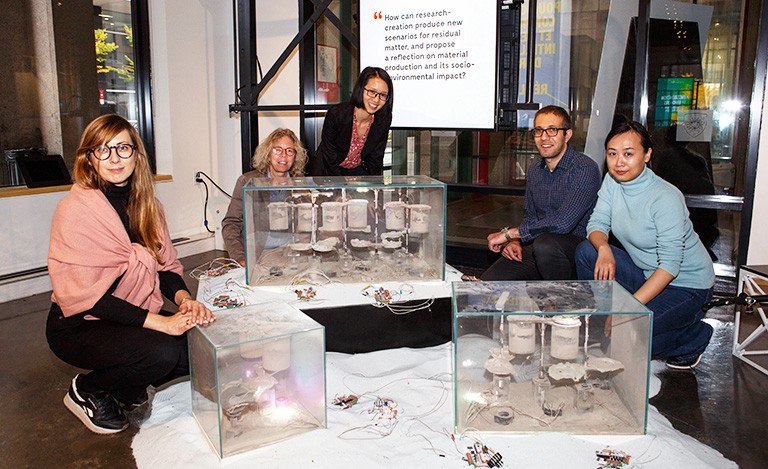FUNDED MASTER'S AND PHD OPPORTUNITIES
Concordia's Canada Excellence Research Chair (CERC) in Smart, Sustainable and Resilient Communities and Cities is looking for engaged, team-minded, and solution-oriented new students to join her team of +50 graduate students, postdocs, and researchers.
The CERC team is transforming cities through innovative technologies and nature-based solutions into zero-carbon, smart, and vibrant neighborhoods. We work on solutions for highest building efficiency, integration of renewable energy systems, sustainable transportation, and circular economy concepts. All developments feed into an urban data and modeling platform that allows us to build future proof scenarios. A new focus is on better user interaction via gamification concepts.

The CERC research explores ways in which cities can operate sustainably while maintaining services for its citizens. It builds on inter- and transdisciplinary research in the areas of environmental complexity, resiliency, and sustainability, emphasizing the use of living labs for demonstration on an urban district scale and advancing urban data and modeling science.
Students are supported by a software development team for the integration of their models to the urban platform.
MASc, MSc, and PhD positions are available for the following topics:
Service distribution and workflow managements for urban scale data management and modeling
Research on multi domain modeling and data acquisition to allow combined simulation of building energy demand and transportation. Integration of urban data for model validation. Evaluation of workflow systems and distributed web services for model combinations. Development of a prototype for workflow management system.
Background in computer science, software engineering, or similar required.
IoT framework for monitoring and control within various workflows in smart cities
Identification of appropriate ameliorative strategies that cover up existing gaps within the city infrastructure. Data management methodology. A select number of control algorithms and management systems that manage the different flows require being instituted. The entire framework needs to be tested, assessed and improved across a pre-defined set of systems that shows that it is capable of handling the various systems, processes and flows within a city and successfully allow efficient management of them.
Background in electrical/chemical/mechanical engineering or similar required.
Gamification of a 3D Urban Simulation Platform (Sim City meets Real Science)
Analysis of how gamification principals can be applied to engage both city-planners and city-dwellers in complex urban development using an interactive 3D simulation platform. More specifically develop and test prototypes, using modern game-engine technologies, to explore player motivations, experiences and behaviours, that will deliver 2 key goals: i) help city planners make more sustainable, resilient and liveable cities, and ii) help citizens learn about their future neighbourhoods and give valuable ‘bottom-up’ feedback.
Background in computer science, software engineering, or similar required. Creative thinker essential. An appreciation of video games is desirable.
Graphical Techniques within a 3D Urban Simulation Platform (Sim City meets Real Science)
Analysis of how graphical techniques, including VR and AR, can be used to visualize complex urban development simulation data, making it both easy to understand and fun to interact with. More specifically develop and test graphical prototypes, using modern game-engine technologies, to explore the effectiveness of your ideas for user interfaces, visual feedback systems and player experiences, in engaging city planners and city dwellers in future versions of their neighbourhoods.
Background in 3D graphics modelling, visual effects, or similar required. Creative thinker essential. An appreciation of video games is desirable.
Prototype development of a graphic editor for smart city simulation
Research on graphical model construction, for example using Eclipse Sirius technology. Development of a prototype that can be used to set up work flows for renewable energy systems or building simulations, for transportation models and other urban modeling challenges. The graphical editor nees to communicate with the backend modeling tools and allow model construction of different scales.
Background in computer science, software engineering, or similar required.
Geovisualisation of urban energy and resource flows
Fast rendering and visualisation of 3D city scenarios including sensor data representation of stationary and moving objects. Develop strategies for 3D city transformation scenarios. Prototype visualisation of urban microclimate such as wind flows, temperature and emission distributions and more.
Background in geo-informatics, computer science, or similar required.
Funding
Successful applicants will be offered a stipend of 20,000 CAD per year for 4 years (PhD) or 15,000 CAD per year for 2 years (MASc/MSc). Limited tuition waivers and other entrance awards are available for international students.
How to apply
Step 1:
If you are interested in becoming a CERC student, please submit your CV and cover letter along with an introduction about your background, experience, and research interests to cerc@concordia.ca
Step 2:
Candidates may apply to the following thesis-based programs:
- Building Engineering
- Civil Engineering
- Computer Science
- Electrical and Computer Engineering
- Information and Systems Engineering
- Mechanical Engineering
- Quality Systems Engineering
- Software Engineering
- Individualized Program
To find details about each program's descriptions and requirements, check the Gina Cody School of Engineering and Computer Science's program catalogue.
Do not hesitate to contact us at cerc@concordia.ca if you have any questions.

